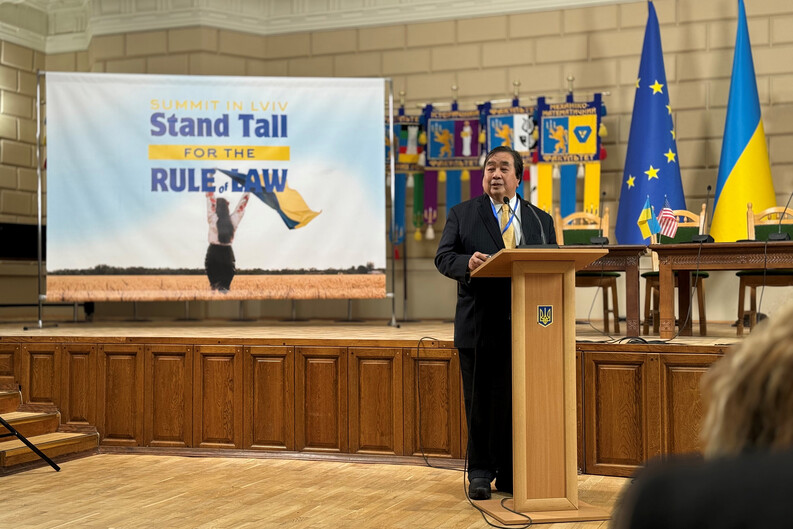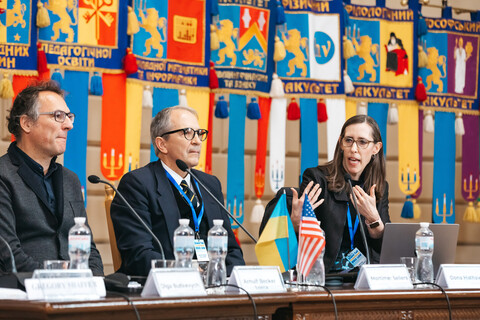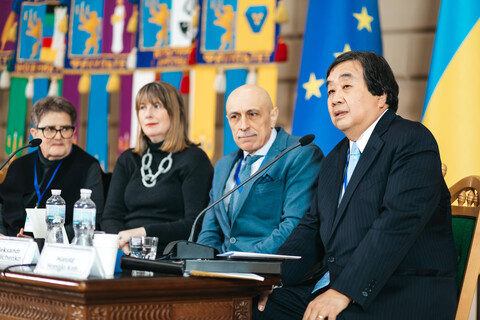In Ukraine, Professors Koh and Hathaway Mark the 75th Anniversaries of Human Rights and Genocide Treaties

Professors Harold Hongju Koh4 and Oona Hathaway ’975 traveled to Lviv, Ukraine this month to join international colleagues in marking the 75th anniversaries of the Universal Declaration of Human Rights and the Genocide Convention.
Koh, Sterling Professor of International Law, and Hathaway, the Gerard C. and Bernice Latrobe Smith Professor of International Law, attended the Stand for the Rule of Law Summit in the historic city of Lviv from Dec. 7 to 10. The event brought together 75 international law experts and 75 Ukrainian counterparts to commemorate these groundbreaking treaties and reaffirm commitment to fundamental principles of international law.
Hathaway, who served on the summit’s steering committee, said, “Spending Human Rights Day in Ukraine was a sobering reminder of how far we still have to travel to make the promises of these treaties a reality.”

Koh moderated the opening panel discussion titled “The Universal Declaration of Human Rights at 75: In Your Hands,” and gave the closing address titled “Standing Tall for the Rule of Law in Ukraine,” which was preceded by a video message from Hillary Rodham Clinton ’73. Hathaway moderated a panel discussion titled “The International Legal Order: Radical Speculation.”
The Summit was held in Lviv to honor the resilience of the Ukrainian people and to celebrate two historic documents and three great figures in international law with connections to the city.
The Convention on the Prevention and Punishment of the Crime of Genocide was adopted by the U.N. General Assembly in Paris on Dec. 9, 1948, and codified the crime of genocide for the first time. Its adoption marked a crucial step towards the development of international human rights and international criminal law. The term “genocide” was coined by Professor Raphael Lemkin of Lviv, who later advised the Nuremberg prosecution team and became a visiting professor at Yale and Duke Law Schools. A human rights prize in his name is awarded at Yale Law School each year.
The Universal Declaration of Human Rights is a milestone document in the history of human rights. It was adopted by the U.N. General Assembly in Paris the following day, Dec. 10, 1948, and is widely recognized as having inspired and paved the way for more than 70 human rights treaties at global and regional levels. The Declaration was inspired, in part, by another law student from Lviv, Sir Hersch Lauterpacht — later a British judge on the International Court of Justice — who authored “An International Bill of the Rights of Man,” and then, as an international law professor at Cambridge, advised Nuremberg Prosecutor Robert Jackson on “crimes against humanity.”

Lviv was thirdly the birthplace of Louis B. Sohn, later an architect of the U.N. Charter and the U.N. Convention on the Law of the Sea, who as an international law professor at Harvard Law School supervised the J.S.D. dissertation of Koh’s late father, Kwang Lim Koh, who later taught international law at both Yale and Boston University Schools of Law.
In his closing keynote, Professor Harold Hongju Koh said, “Every so often the challenges of a single country and its people touch our hearts and intersect with our life’s work advancing international law.” Koh called this “a new architectural moment.”
Koh closed by noting that Professor Sohn of Lviv had taught Koh’s father, who had inspired both him and another attendee, Koh’s nephew Steven Arrigg Koh6, Associate Professor of International Law at Boston University and Visiting Scholar at Yale Law, to teach the next generation of international law students.
As an air alert signal sounded, Koh concluded, “Even as Ukraine’s soldiers bravely fight and its diplomats look for openings, we international lawyers must reimagine our legal structures to build a better future, … play[ing] the long game, over generations if need be.”
The Summit was jointly organized by the American Society of International Law and the Ukrainian Association of International Law.


